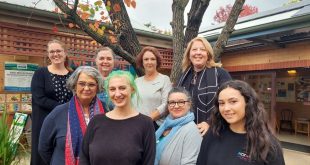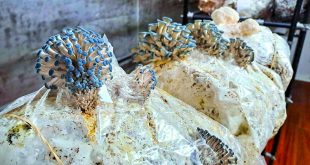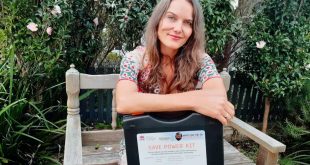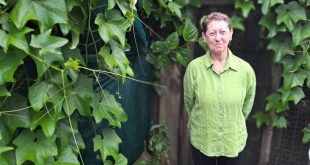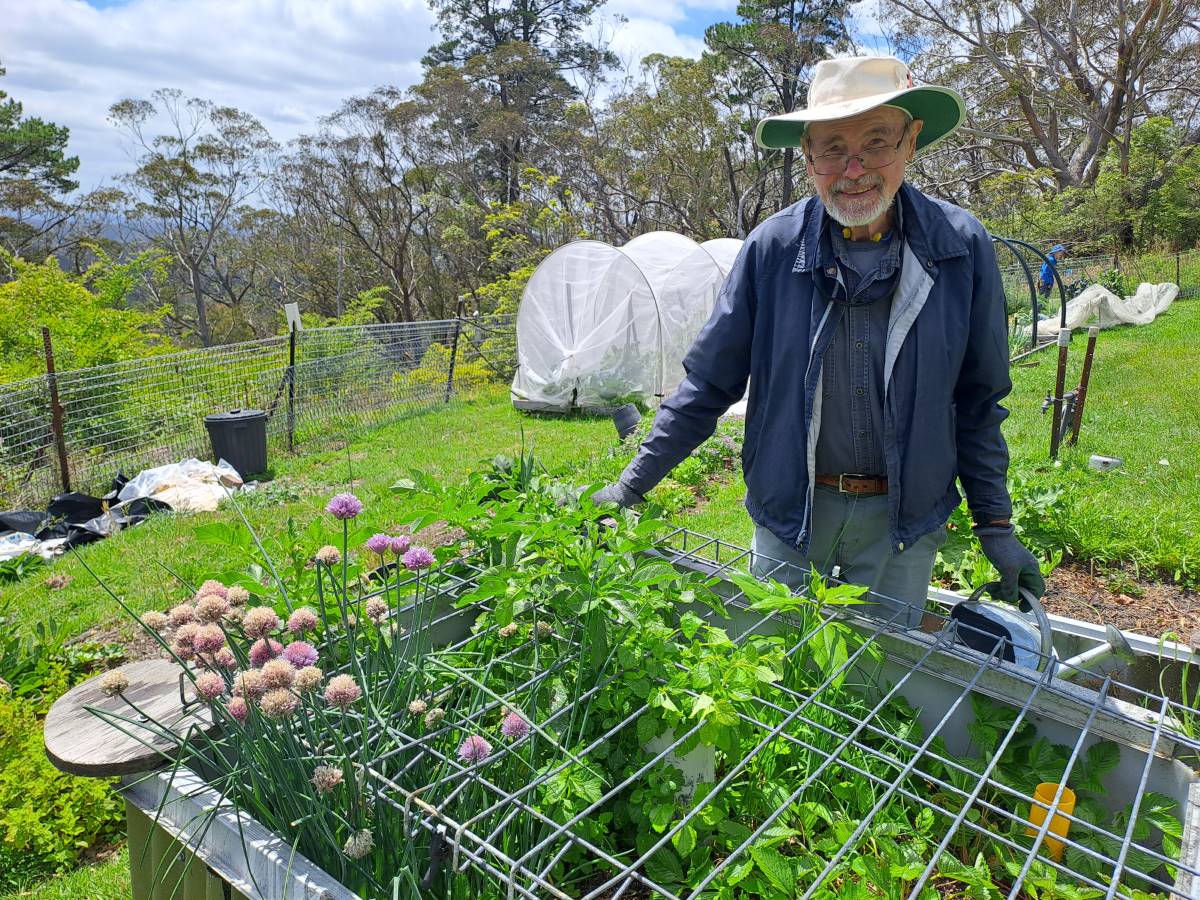
Ray Kennedy at Mid Mountains Community Gardens
Story and photos by Belle Butler
Growing fruit and vegetables is immensely gratifying, on top of the healthy food it produces and the money it can save compared to supermarket prices. But doing it consistently well is hard: and that’s where Community Gardens are an invaluable resource. Visit Mid Mountains Community Garden with Belle Butler to dig deeper.
Key Points:
- Community gardening provides an opportunity to grow food without the pressure of maintaining a veggie patch all on your own.
- Community gardening utilises the skills, knowledge and hard work of many, allowing for better growing systems, more success and faster maintenance.
- Community gardens build resilience at a local level by strengthening relationships, increasing food security, and providing opportunities to upskill and knowledge swap.
I have a complex relationship with my veggie patches. When we are on good terms, I lavish them with my attention and love, and they flourish and thrive and offer their bountiful fruit in return. We meet each other’s needs and show our gratitude and respect in how we provide for each other.
But then I withdraw. Sometimes for a few days, other times inflicting long bouts of neglect while I busy myself elsewhere. There are many distractions that come between us, and my veggie patches are not particularly accepting of my multiple life-affairs. They demand consistent attention. And if they don’t get it, they show their displeasure. They wilt. They shrivel. They refuse to provide. And then the weeds come in and declare the relationship over.
My show of intermittent love is the result of a particularly busy time of life. At least, that’s the excuse I’m going with, and one that I’ve commonly heard from others attempting similar relationships in their own backyards. The good news is, just because you can’t keep up your end of the deal in a monogamous relationship with your veggie patch at home, it doesn’t have to be the end! Polyamory in the veggie patch world does wonders for all involved.
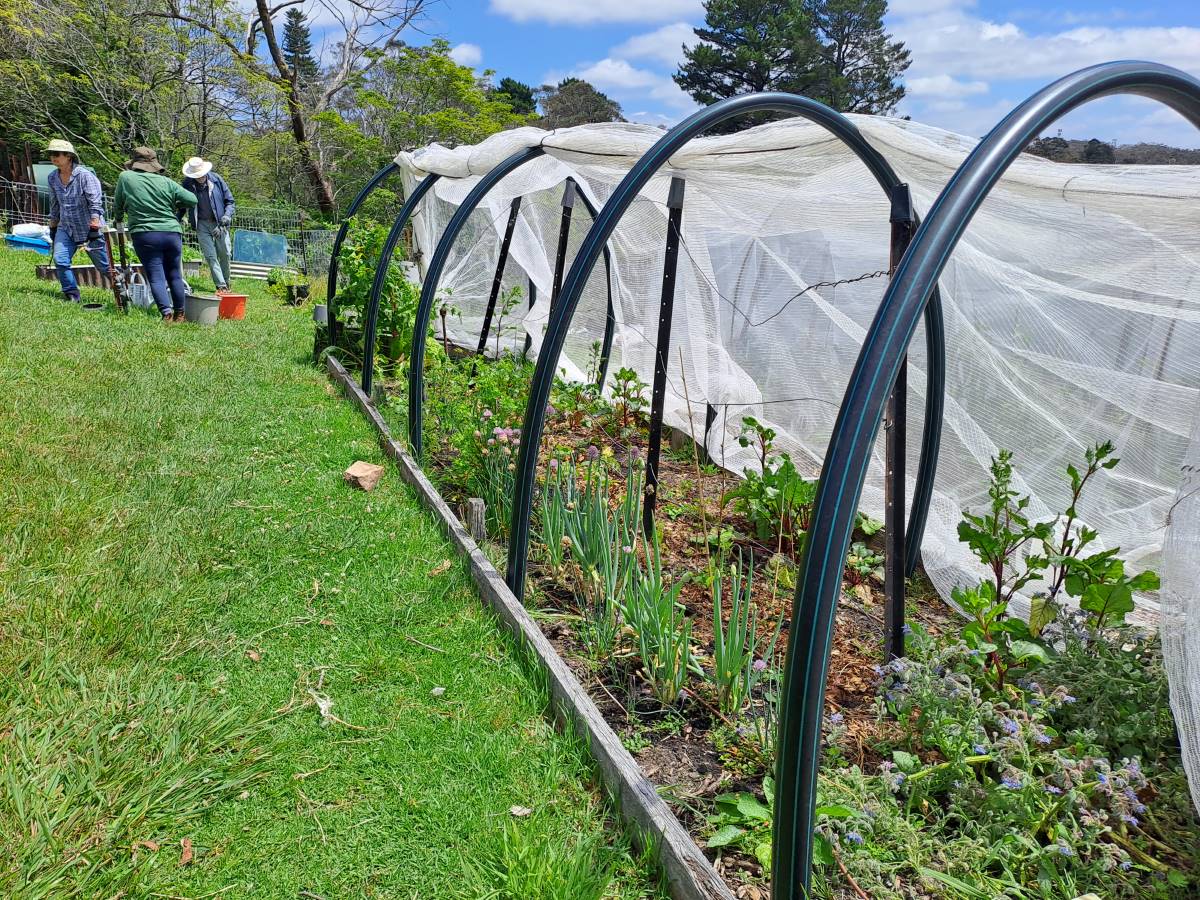
Volunteers gather at Mid Mountains Community Garden.
In all seriousness, community gardens, like the Mid Mountains Community Garden on Queens Road in Lawson, offer an excellent opportunity to upskill, connect with others and grow food, without the pressure of maintaining a patch all on your own.
Further, community gardening builds resilience at a local level by strengthening relationships, increasing food security, providing an opportunity to share tips and knowledge, problem solve, and work towards building self-sustaining communities.
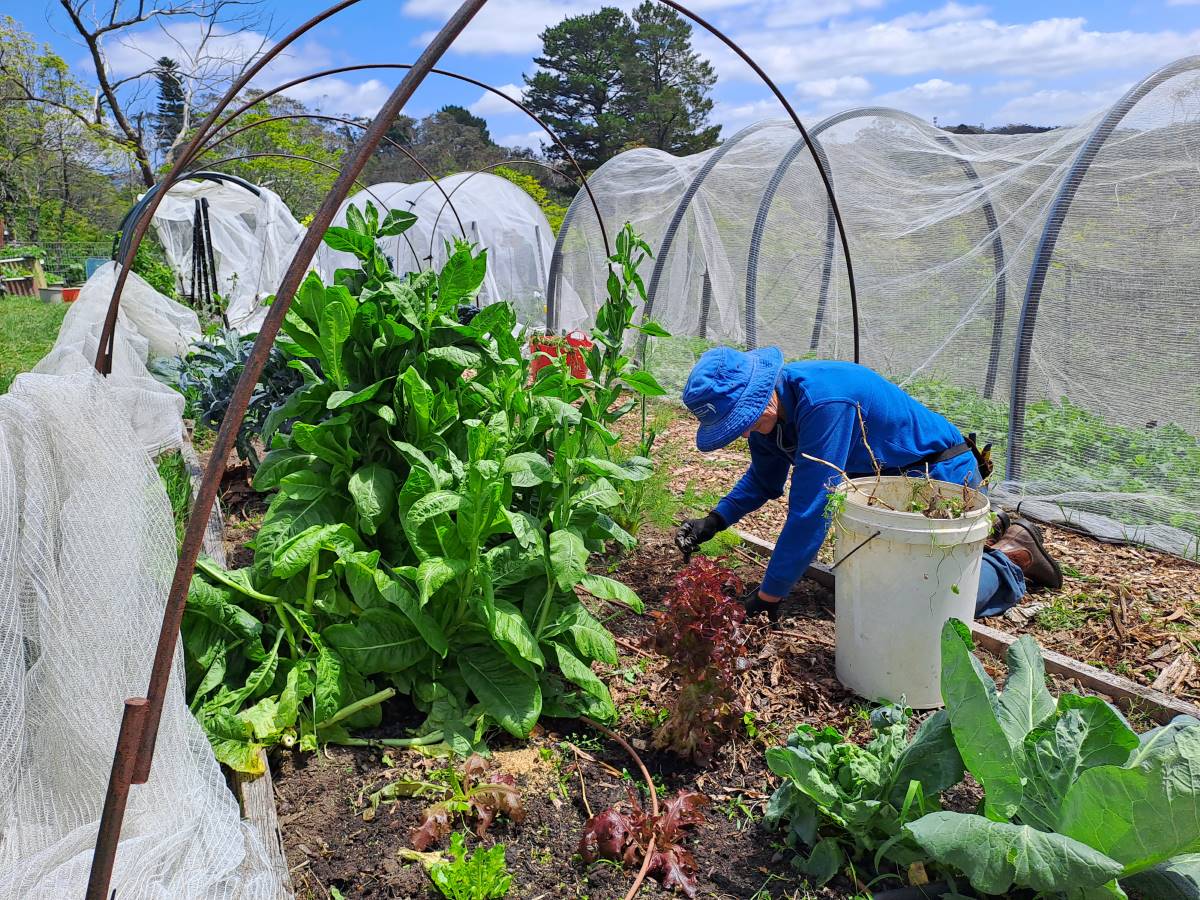
Janet pulling weeds in one of the veggie patches at Mid Mountains Community Garden
When I visited Mid Mountains Community Garden, a handful of volunteers were busily tending to multiple beds of fine produce. It was clear that while the gardens benefitted from their concerted effort, the people participating also benefitted.
Janet, one of the longest-attending members, shared with me some of things she loves about community gardening: “Learning more about gardening including water saving, seasonal rotation of plants and weeds versus veggies, enjoying the company of like-minded people, passing on knowledge to others, and sharing ideas.”
Kathy Husselbee from Wentworth Falls, who makes the trip down to Lawson to take advantage of the slightly warmer climate below Boddington Hill, added to that list: “Putting your hands in soil, socialising, having the chance to take home produce, and feeling like you’re on the good side. If you feel like you’re meeting people and doing something positive, it’s a good thing.”
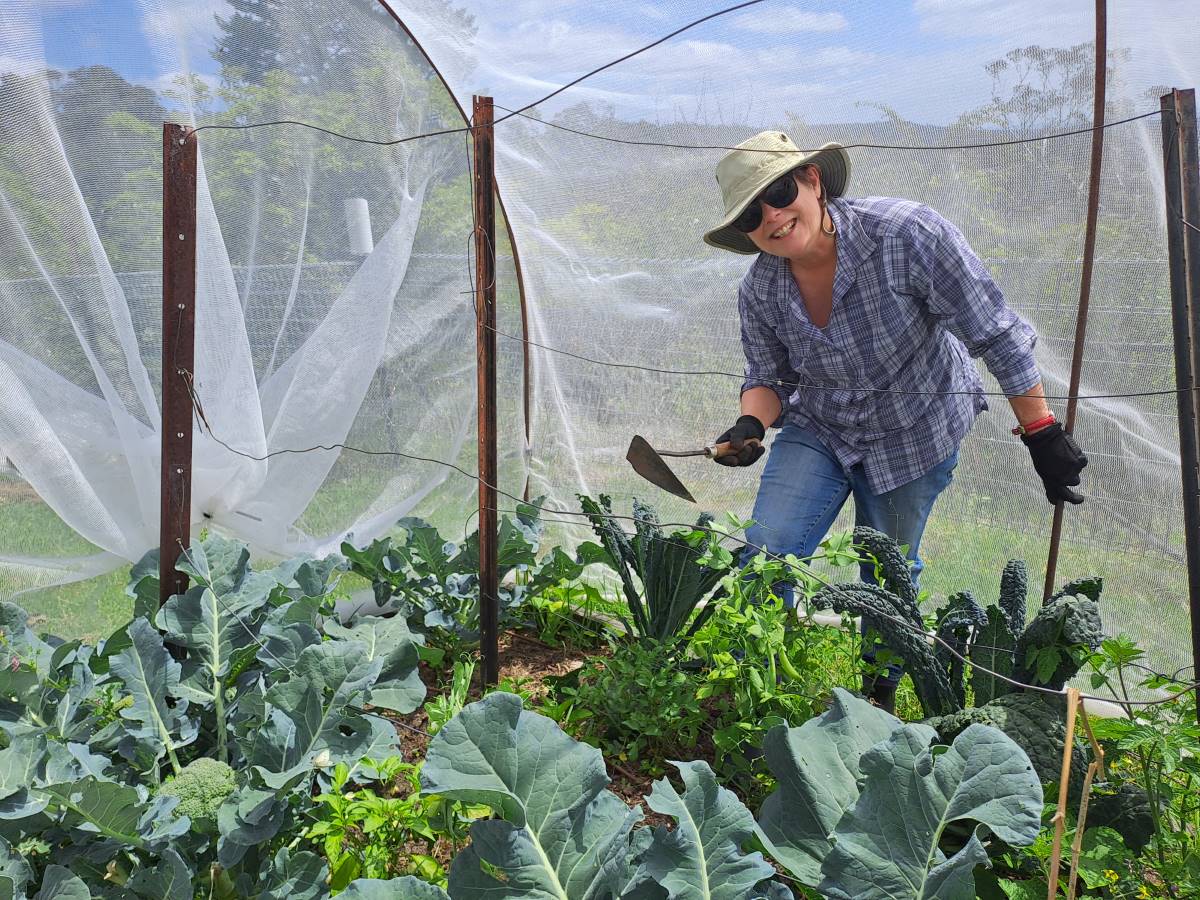
Kathy Husselbee comes to the Community Garden from Wentworth Falls
Another volunteer, Margaret Bell, joined the group during Covid, when a neighbour thought she needed cheering up. I asked her if participating in the Community Garden achieved that goal and she didn’t hesitate: “Oh yes, it cheered me up!” She added that as a vegetable lover, she greatly appreciates the opportunity to learn how to grow vegetables, which she wouldn’t otherwise be able to do due to a shady garden at home.
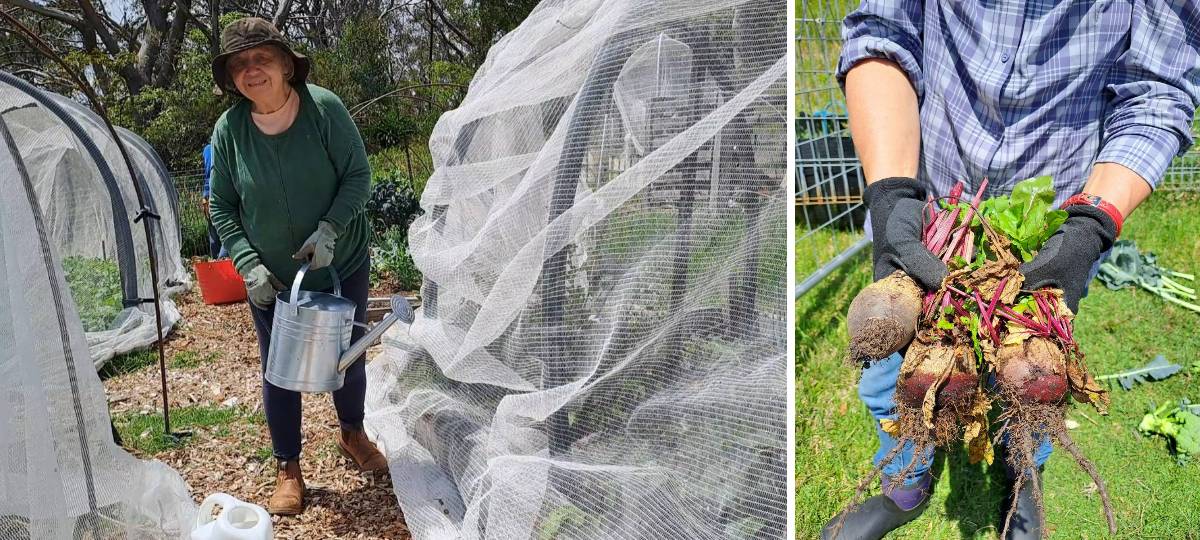
Left: Margaret Bell found that community gardening cheered her up during Covid. She’s been participating ever since. Right: Taking home tasty produce is one of the perks of participating in community gardening.
Knowledge sharing is a particular benefit of attending the gardening days, which take place every Saturday from 9am to 12pm. Volunteers come from a range of backgrounds and boast varying levels of expertise, with founding members like Ray Kennedy, a gardener by trade, and Janet, a local Bushcare volunteer of many years, bringing years of local experience to the group.
As a group, they work together to solve problems and improve systems. “One challenge we face is water and a warming climate,” said Kathy, explaining that one of the ways they are dealing with this problem is by creating wicking beds. With funding they received from participating in the Edible Gardens Trail, they created two wicking beds with different systems: one with irrigation pipe at the base, and one with washed river sand.
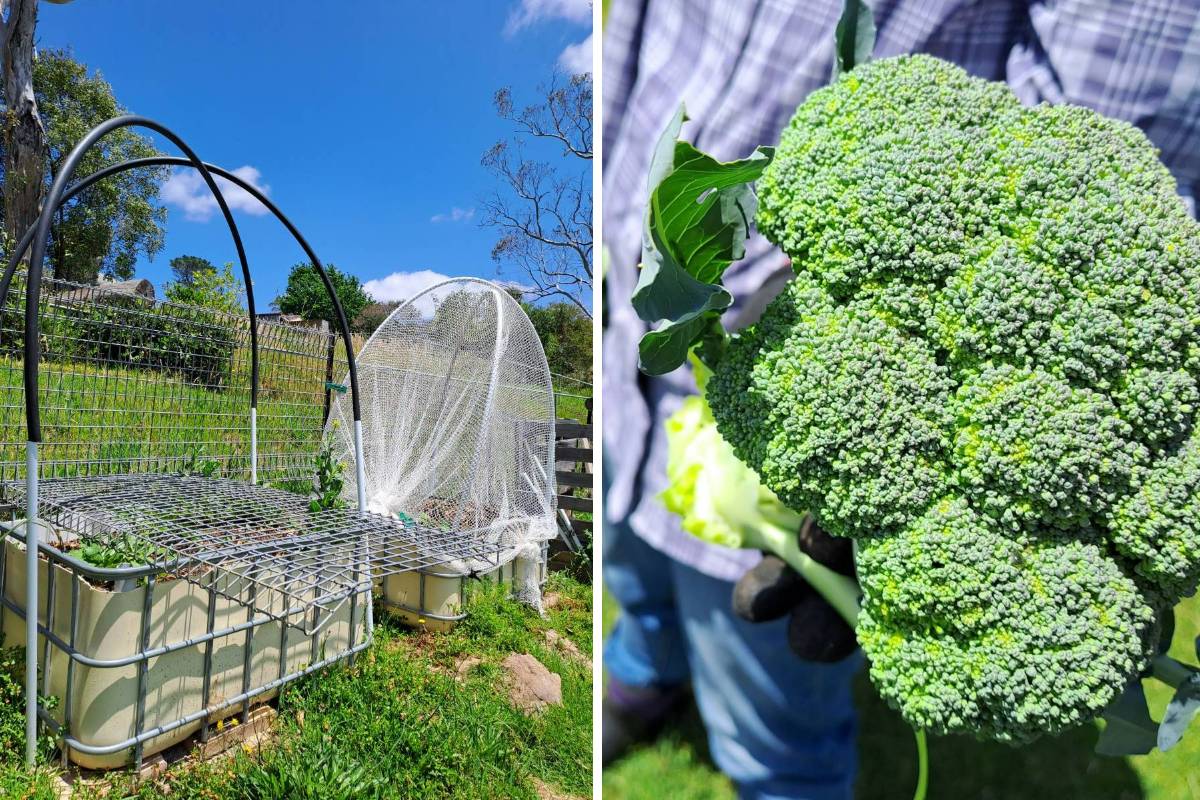
Left: Wicking beds are one way Mid Mountains Community Garden is facing the challenge of water management in a changing climate. Right: A beautiful head of broccoli picked from one of the patches.
In another effort to manage water, they installed a drip irrigation system connected to tank water. “When the weather gets hotter, we limit the amount of water via drip irrigation to get the plants used to less water,” said Ray.
Members have also worked hard to create a closed loop system that doesn’t rely on outside inputs. Janet explained that instituting a rotating green manure system on site has been worthwhile: “We are currently leaving one garden bed fallow each three months. Into this bed we plant a ‘green manure’ crop,” she said. “The intention is to rest the soil and to improve the soil health. I think it is working as our most recent crops seem to have grown quicker and to be flowering sooner.”
Ray added: “We use seeds with different functions [for the green manure]. Importantly, you need to dig it in before it flowers. When the plant flowers, all the goodness goes to the flower, so dig it in before then so that the goodness goes back into the soil. Since using this system, we haven’t needed to use any fertilisers, only green manure and we add in some worm juice.”
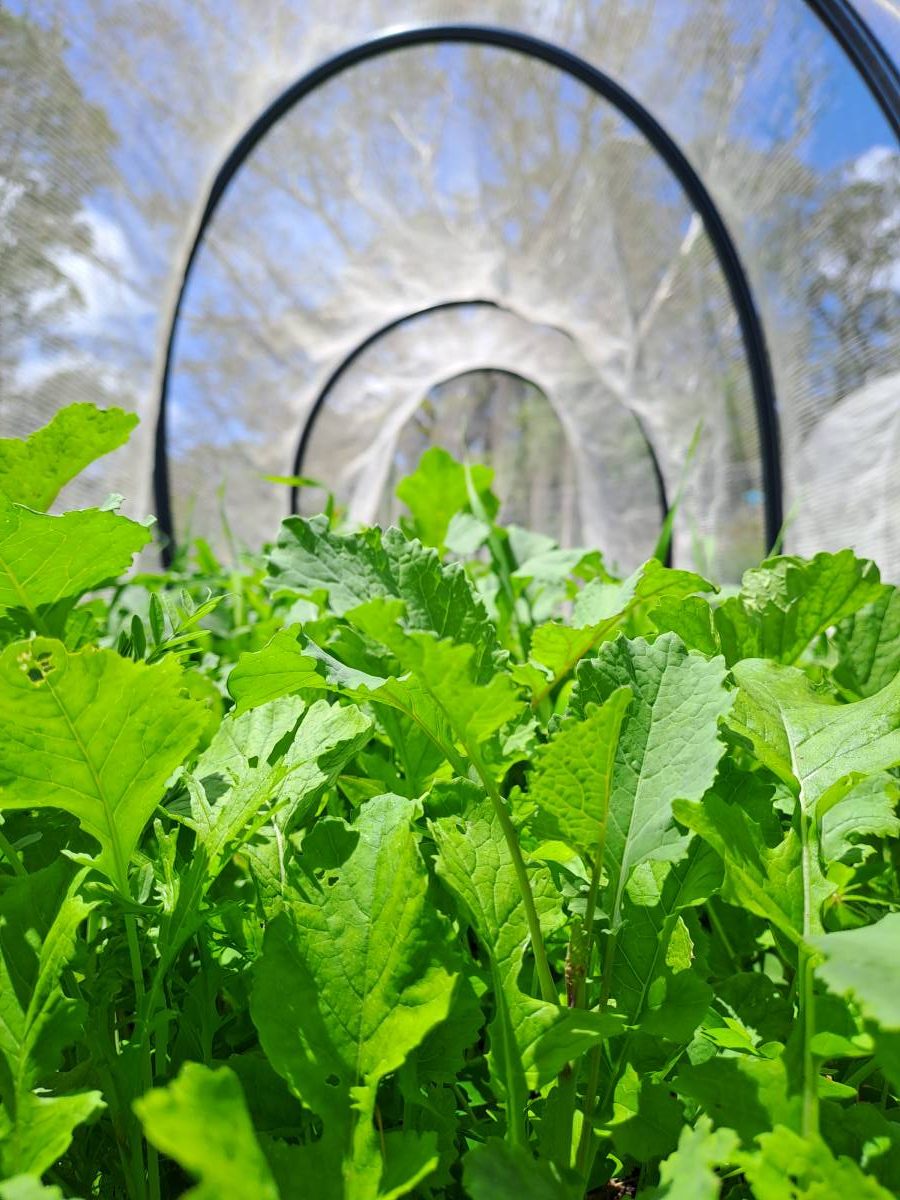
A lush ‘green manure’ that will soon be dug in to improve soil health.
In a world of ever-increasing personal busyness, as well as known and unknown environmental challenges ahead, community gardening just makes sense.
You can join Mid Mountains Community Garden simply by showing up on Saturday between 9am and 12pm. Get your hands into the soil, have a good chat, and leave with produce and knowledge, like Ray’s final advice to me before I left: “If you find a plant that works in a particular area, then get the seed, because it will continue to grow well there every time. It’s in their DNA to cope with the issues of that area.” A solid tip that can be applied to all veggie patch relationships.
Click to view a short 30-second video shot on a recent sunny Saturday
Take Action:
- Get involved at Mid Mountains Community Garden every Saturday between 9am-12pm at Kihilla Retreat & Conference Centre, 5-17 Queens Road Lawson NSW 2783 (Map & Directions)
- Learn more about community gardens, and find other nearby gardens at https://communitygarden.org.au/
- Get inspired on the 2024 Blue Mountains Edible Garden Trail, March 2-3. Learn more at https://www.katoombalocalnews.com/event/blue-mountains-edible-garden-trail/
Share this article:
This story has been produced as part of a Bioregional Collaboration for Planetary Health and is supported by the Disaster Risk Reduction Fund (DRRF). The DRRF is jointly funded by the Australian and New South Wales governments.
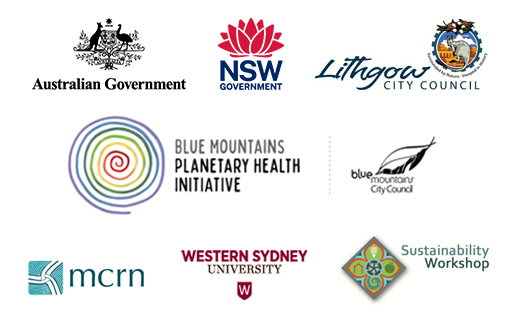
More from around the region
Find out how you can join our team of writers and videographers next Saturday 25 May! Our stories drive and transform our culture. Over the last 15 months we’ve hired staff, run workshops and mentoring programs for aspiring writers and videographers, and welcomed volunteers to our team, so we can find and share the solutions we need. If, as communities, we work together to support one another and to share better ways of doing things, future extreme weather events are less likely to become disasters and we’ll have the capacity to do what needs to be done to restore the health of our planet so that all life can flourish. Would you like to join our fabulous and growing team! Next Saturday evening at 7pm we’re launching the Planetary Health Writers’ Network, following a workshop with award-winning writer Sophie Cousins from 2-5pm. Join us! All ages welcome. Registration essential for the workshop here (link in profile): https://bit.ly/3V6kQke and for the Writers’ Network here (link in profile): https://bit.ly/4dLOthL
Both events are free thanks to funding from Disaster Risk Reduction Fund (DRRF). The DRRF is jointly funded by the Australian and New South Wales governments.
#changethestory #solutionsmedia #togetherwecan #writers #videographers #creativesforclimate #planetaryhealth #katoomba #bluemountains #collaboration #writersnetwork
In April 2021 Blue Mountains City Council became the first Council and government entity in Australia to commit to integrating Rights of Nature (RON) principles into its operations and practices. Yesterday we were thrilled to be able to spend a few hours with Susie Talbot, an Australian lawyer, based in the UK, who was visiting on a Churchill Fellowship to explore the implementation of Rights of Nature in different parts of the world. It was inspiring to hear how she has spent decades using the law to achieve transformative change in relation to complex socio-economic and environmental challenges. In 2020, she founded the Anima Mundi Law Initiative to strengthen the intersections between human rights and ecology, and to encourage the practice of law in alignment with planetary realities and collective consciousness. Projects include the creation of a ‘Rights of Nature Toolkit’ and we look forward to working with her into the future. You can read more at her website: https://www.animamundilaw.org/
Photo: Susie Talbot standing in front of Scott Marr`s artwork in the Planetary Health Exhibition space.
#rightsofnature #earthjurisprudence #anewlegalstoryforanecologicalage #ecologicalage #churchillfellowship @churchillfellowship #animamundi #humanrights #ecology #planetaryhealth
Nelson Mandela once said “Education is the most powerful weapon which you can use to change the world”; and William Butler Yeats, the great poet, said “Education is not the filling of a pail but the lighting of a fire.” If you’re a teacher, educator or involved in education in some way in the Blue Mountains the staff of the Blue Mountains Planetary Health Initiative would love to meet you next Monday 20th May when we join the Blue Mountains Sustainable Schools Network to see how we can all join forces to urgently accelerate the change we need to restore the health of our planet. 3.30-5.30 at Faulconbridge Public School. RSVP Beth Healy DirtMum (details in poster)
#sustainableschoolsnetwork #collaboration #planetaryhealth #environmentaleducators #artteachers #englishteachers #musicteachers #allteachers
Hans and Tillie Coster have brought a Tolkien fantasy to life, building an underground Hobbit Hall at their property ‘Middle Earth’ in the Kanimbla Valley. They`ve come very close to self-sufficiency, storing their solar power in banks of nickel-iron batteries, and building underground has meant they`re more able to withstand extreme weather events. They`ve also reforested degraded country, planting over 3000 trees! Read more in Lithgow Area Local News (link in profile):
https://lithgowlocalnews.com/middle-earth-kanimbla-valley/
#middleearth #hobbiton #hobbithall #kanimblavalley #selfsufficient #offgrid #nickeliron #solarbatteries #nickelironbatteries #reforestation #undergroundhouse #compostingtoilet #disasterriskreduction #planetaryhealth
There are only about 750 Dwarf Mountain Pine plants left in the wild, according to the latest survey. The survivors are limited to waterfall spray and seepage zones in the southern escarpment between Katoomba and Wentworth Falls, but renewed efforts to save it in light of its potential upgrade to ‘critically endangered’ status are giving greater recognition to a rare and unusual prehistoric native in our midst. Read more in Katoomba Area Local News (link in profile)
https://www.katoombalocalnews.com/saving-the-dwarf-mountain-pine/
#dwarfmountainpine #criticallyendangeredspecies #prehistoricnative #biodiversity #collaboration #whatwecando #katoomba #wentworthfalls #bluemountains #planetaryhealth
Our Planetary Health newsletter is now out, sharing inspiring stories from the Lower Mountains to Lithgow: Read it here and subscribe via any of the Local News sites: https://bit.ly/3QKevs6 (link in profile)
Katoomba Area Local News: Living on the Ledge: Saving the Dwarf Mountain Pine
Lithgow Local News: How a Tolkien Fantasy Turned Into Off-grid Reality at Middle-Earth in the Kanimbla Valley
Blackheath Area Local News: Inspirational, Intergenerational Play in Blackheath
Lower Mountains Local News: The Positive Social Impact of the Glenbrook Country Women’s Association
Mid Mountains Local News: Stronger Together: Mid Mountains Neighbourhood Centre Walks the Talk
Springwood Area Local News: People Of Binfluence: The 2024 Binfluencer Awards
#solutionsmedia #hyperlocalnews #planetaryhealth #localstories #inspiration #bluemountains #lithgow
Woohoo we just hit 1 MILLION views on our reel about Physicist Hans Coster and why he`s using nickel-iron batteries.
You can now read the full story and watch a video about him and his wife Tillie at their property Middle Earth (links in profile). We`d love you to subscribe to our Blue Mountains Planetary Health YouTube channel and share the latest video on him there as well.
The video is fabulous:
https://www.youtube.com/watch?v=3kqAczIRzqk&t=17s
#offgrid #underground #nickelironbatteries #planetaryhealth #reforestation #selfsufficient #middleearth #bagshotrow
A small group of Blue Mountains women is helping local women survive and thrive and also contributing to improve maternal and newborn survival in developing countries. Assembling birthing kits for women in remote locations is just one of the many ways the @zontaclubbluemountains is empowering and supporting women, both abroad and at home. Read more in Lower Mountains Local News (link in profile)
https://lowermtnslocalnews.com/zonta-blue-mountains/
#womensupportingwomen #maternalhealth #birthingkits #zontainternational #zonta #abetterworldforwomen #localaction #localactionglobalimpact #planetaryhealth
We are thrilled to announce that award-winning health writer and author Sophie Cousins will be leading the workshop: Our Community, Our Stories: Writing for Change from 2-5pm on Saturday 25 May at the Planetary Health Precinct. Sophie`s work has been published in the New York Times, London Review of Books, the Guardian, the Lancet, Meanjin and others. She also works as a public health consultant for the World Health Organisation. The workshop will be followed at 7pm by the launch of the Planetary Health Writers Network. Places are limited so bookings essential (link in profile): https://www.eventbrite.com.au/e/our-community-our-stories-writing-for-change-tickets-895548458547
#writingforchange #impactfulstories #solutionsjournalism #writingworkshop #planetaryhealth #changethestory #thenewsweneed #writersnetwork #bluemountains #katoomba
We`re thrilled to welcome Tamsyn McGrouther to our growing team of volunteer storytellers. She`s reporting on how the Springwood Lot Party transformed an underused space, the car park at Springwood Train Station, into a vibrant community space with food stalls, art opportunities and live music. Read more in Springwood Area Local News (link in profile) : https://springwoodlocalnews.com/springwood-lot-party-2024/
#changethestory #hyperlocalmedia #solutionsmedia #springwood #inspiringstories #planetaryhealth #bluemountains #localnewsmatters
What do tea, samurai clans, William McArthur, Benjamin Franklin, Vietnam and the Botanic Gardens at Mount Tomah have in common? Read our story in Blackheath Area Local News to explore the way camellias and cultures are woven together and why it’s important we think about conserving biodiversity as a global project implemented at a local level. (link in profile) https://blackheathnews.com/camellias-at-blue-mountains-botanical-garden/
@botanicsydney #botanicgardens #mountomahbotanicgardens #camellias #camelliasinensis #tea #samurai #bluemountains #themounts #biodiversity #planetaryhealth
Mushrooms are a hot topic at the moment with more and more research illuminating the essential role these organisms play in the health of the planet as well as the significant health and medicinal benefits they hold for humans. Belle Butler visited local mushroom grower, Alex Felix, at his farm in Lawson to talk about the mighty mushroom. Read more in Mid Mountains Local News (link in profile)
https://www.midmtnslocalnews.com/earthrising-mushroom-farm/
#mushroomgrowkit #mushrooms #fungi #growyourown #lawson #bluemountains


